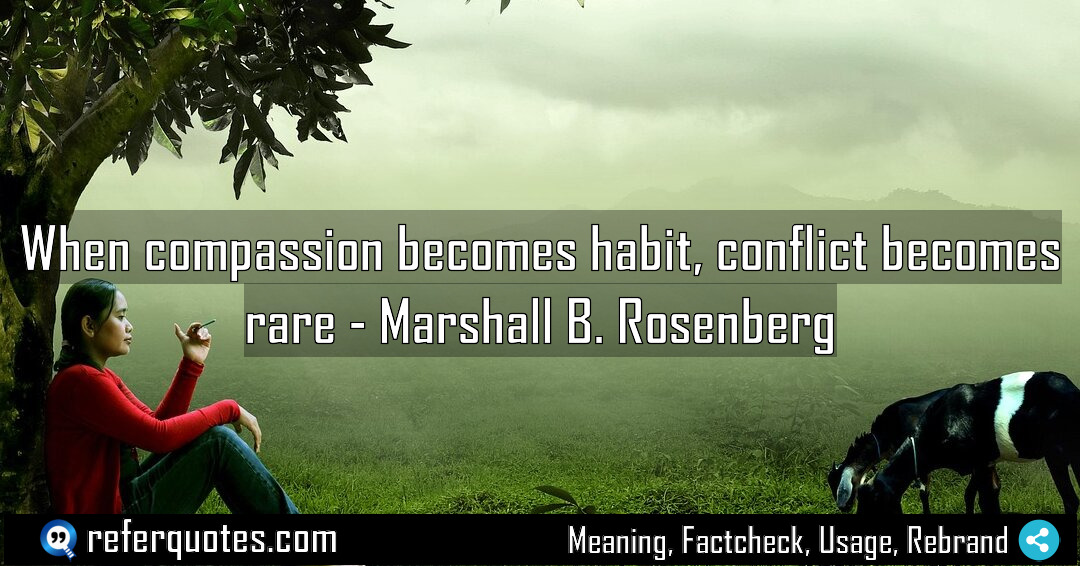
When compassion becomes habit, conflict becomes rare… it’s one of those quotes that sounds simple but completely reframes how you approach relationships. It’s not about being nice; it’s about building a specific kind of emotional muscle memory. Once that’s in place, arguments just don’t have the same fuel.
Share Image Quote:
Table of Contents
Meaning
The core message is that compassion, when practiced consistently, stops being a conscious effort and starts being your default reaction. And that automatic, gut-level empathy fundamentally changes the dynamics of any interaction, making conflict almost unnecessary.
Explanation
Let me break it down the way I see it after working with this for a while. Most of us think of compassion as something you *do* in a difficult moment—you consciously decide to be understanding. But Rosenberg is talking about something deeper. He’s talking about making it a habit, a reflexive part of your personality, like brushing your teeth.
And here’s the magic: when that shift happens, you’re not just reacting to conflict differently; you’re actually pre-empting it. You start listening to understand the need behind someone’s anger, not just the words. You express your own feelings without blame. The whole “us vs. them” energy just… dissolves. It becomes a collaborative “us vs. the problem.” And in that space, conflict is just inefficient.
Quote Summary
Reading Level60
Aesthetic Score94
Origin & Factcheck
This quote comes directly from Marshall B. Rosenberg’s 2005 book, Raising Children Compassionately: Parenting the Nonviolent Communication Way. It’s a core tenet of his Nonviolent Communication (NVC) framework. You sometimes see it floating around unattributed, but it’s 100% his.
Attribution Summary
Where is this quotation located?
| Quotation | When compassion becomes habit, conflict becomes rare |
| Book Details | Publication Year/Date: 2004; ISBN/Unique Identifier: 9781892005140; Last edition: PuddleDancer Press, 1st Edition, 48 pages. |
| Where is it? | Chapter: Habit of Compassion, Approximate page from 2004 edition |
Context
It’s crucial to remember this was written for parents. Rosenberg was applying this profound philosophy to the daily, messy, emotionally charged battlefield of family life. He wasn’t theorizing about world peace in an abstract sense; he was giving parents a practical tool to stop the yelling matches over homework and chores. If it works there, it works anywhere.
Usage Examples
So, how do you actually use this? It’s not about memorizing the quote. It’s about the practice.
- For a team leader: Instead of seeing a missed deadline as defiance, habitually ask, “I wonder what need wasn’t met for them? Was it clarity? Resources?” That compassionate curiosity leads to solutions, not blame.
- In a relationship: When your partner is snippy, the habit isn’t to snap back. It’s to pause and think, “They’re probably tired or stressed,” and maybe just make a cup of tea. It de-escalates everything.
- For yourself: This is the big one. When you mess up, make self-compassion a habit. Instead of the inner critic, you learn to ask, “What was I needing in that moment?” It stops the internal conflict.
To whom it appeals?
Share This Quote Image & Motivate
Motivation Score90
Popularity Score95
Shareability Score95
FAQ
Question: Isn’t this just being a doormat?
Answer: Absolutely not. That’s the biggest misconception. Compassionate habit isn’t about letting people walk all over you. It’s about hearing their need *and* clearly and firmly expressing your own. It’s connecting *before* setting a boundary, which makes the boundary 10x more effective.
Question: How long does it take to form this “habit”?
Answer: It’s a lifelong practice, honestly. You don’t just flip a switch. But you start seeing small shifts fast—maybe in a few weeks or months. The first win is just catching yourself *before* you react with anger. That pause is the habit starting to form.
Question: Does this mean conflict is bad?
Answer: Great question. No, conflict of ideas and needs is natural and healthy. Rosenberg’s quote says conflict becomes *rare*, not that it’s eliminated. The destructive, personal, hurtful kind of conflict becomes rare because you’re channeling that energy into creative problem-solving instead.
Similar Quotes
You know, when Brene Brown says “Compassion is not a virtue — it is a commitment,” she’s really flipping the script on how we see empathy. It’s not some magical…
Compassion is not a trait we have or do not have. It’s a daily practice that reshapes our entire perspective, turning empathy from a feeling into a consistent, world-changing action.…
Blame and judgment disconnect us from compassion. It’s a simple but profound truth that, once you see it, changes how you interact with everyone. This idea is the absolute bedrock…
We can’t practice compassion with other people… because that inner critic we all carry? It doesn’t just talk to us. It becomes the template for how we engage with everyone…
You know, “Conflict handled with respect creates stronger relationships” is one of those truths that seems counterintuitive until you live it. I’ve seen teams completely transform when they stop running…
